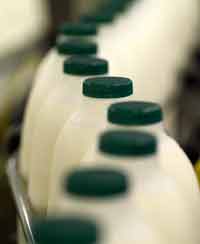EU ministers call for more dairy support

Attempts by France and Germany to impose a freeze on milk quotas and increase intervention prices and export refunds for dairy products appear to be foundering.
While there was widespread support at this week’s EU farm council in Brussels for Franco-German plans to help dairy farmers through the current crisis, most member states believed that they should stick with last year’s “health check” agreement.
That will raise quotas by 1% each milk year, prior to removing them altogether in 2015.
EU agriculture commissioner Marian Fischer Boel also rejected calls in the Franco-German “declaration” for higher intervention prices for butter and skimmed milk powder.
“This is out of the question,” she said. “If we increase intervention for butter and skimmed milk powder, it could encourage member states to move into those products. These are not technologically advanced products and it could be counterproductive.”
Mrs Fischer Boel explained that the commission had already extended the period in which intervention stores will be open (subject to council ratification next month) and claimed that the dairy markets had bottomed out already.
For example, Dutch spot milk prices had climbed 23% in just a month, EU butter prices were well above intervention levels and the recent auction by New Zealand co-op Fonterra had seen a significant rise in whole milk powder values.
Mrs Fischer Boel did encourage member states to explore an idea put forward in the commission’s July dairy market report, for member states to apply a superlevy on individual farmers who exceed their quotas, even if the country as a whole is under quota.
Funds raised this way would be used to buy up quota as part of an early retirement scheme, though the commissioner insisted this would be voluntary.
But member states were split on the issue, and it is thought unlikely that farm ministers will call for formal proposals on this issue.
Sources close to the discussion said the more likely development was for the EU Commission to extend the availability of state aid, allowing member states to pay up to €15,000 (£13,200) to individual farmers under the Temporary Crisis Framework.
Country of origin labelling could also be strengthened, while the commission is continuing its investigation into the functioning of the supply chain.
EU farm ministers said they would return to the issue of how to support the dairy sector at their October meeting.
The European Milk Board, representing the EU’s more radical dairy farmers, is due to meet in Paris on Thursday (10 September) to decide on their next course of action, with strike action a distinct possibility.
* For a FW view on remedies for the dairy crisis, see Phil Clarke’s Business Blog

